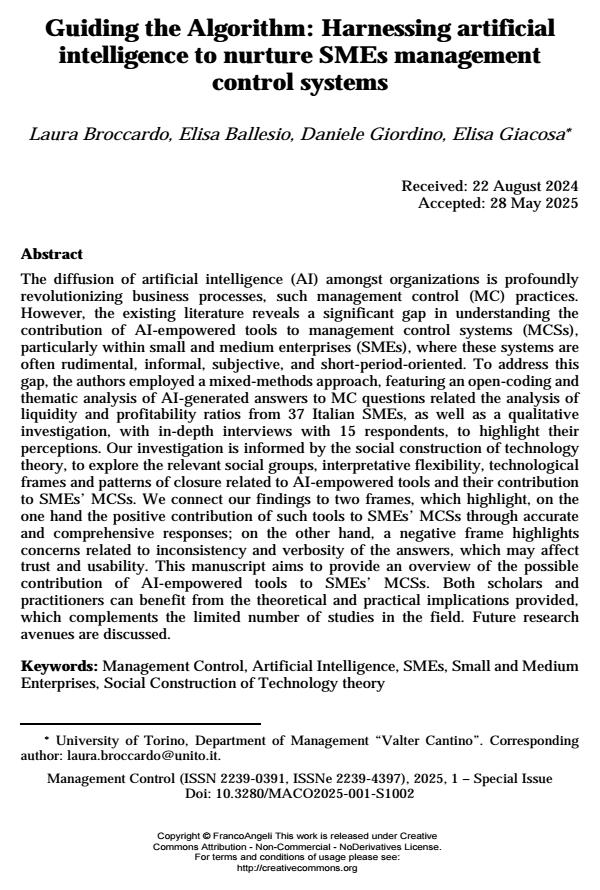Guiding the Algorithm: Harnessing artificial intelligence to nurture SMEs management control systems
Titolo Rivista MANAGEMENT CONTROL
Autori/Curatori Laura Broccardo, Elisa Ballesio, Daniele Giordino, Elisa Giacosa
Anno di pubblicazione 2025 Fascicolo 2025/1 Suppl.
Lingua Inglese Numero pagine 24 P. 13-36 Dimensione file 153 KB
DOI 10.3280/MACO2025-001-S1002
Il DOI è il codice a barre della proprietà intellettuale: per saperne di più
clicca qui

FrancoAngeli è membro della Publishers International Linking Association, Inc (PILA), associazione indipendente e non profit per facilitare (attraverso i servizi tecnologici implementati da CrossRef.org) l’accesso degli studiosi ai contenuti digitali nelle pubblicazioni professionali e scientifiche.
The diffusion of artificial intelligence (AI) amongst organizations is profoundly revolutionizing business processes, such management control (MC) practices. However, the existing literature reveals a significant gap in understanding the contribution of AI-empowered tools to management control systems (MCSs), particularly within small and medium enterprises (SMEs), where these systems are often rudimental, informal, subjective, and short-period-oriented. To address this gap, the authors employed a mixed-methods approach, featuring an open-coding and thematic analysis of AI-generated answers to MC questions related the analysis of liquidity and profitability ratios from 37 Italian SMEs, as well as a qualitative investigation, with in-depth interviews with 15 respondents, to highlight their perceptions. Our investigation is informed by the social construction of technology theory, to explore the relevant social groups, interpretative flexibility, technological frames and patterns of closure related to AI-empowered tools and their contribution to SMEs’ MCSs. We connect our findings to two frames, which highlight, on the one hand the positive contribution of such tools to SMEs’ MCSs through accurate and comprehensive responses; on the other hand, a negative frame highlights concerns related to inconsistency and verbosity of the answers, which may affect trust and usability. This manuscript aims to provide an overview of the possible contribution of AI-empowered tools to SMEs’ MCSs. Both scholars and practitioners can benefit from the theoretical and practical implications provided, which complements the limited number of studies in the field. Future research avenues are discussed.
Parole chiave:Management Control, Artificial Intelligence, SMEs, Small and Medium Enterprises, Social Construction of Technology theory
- Le aziende nell'era della twin transition: i sistemi di management e controllo a supporto dell'agilità e della resilienza Antonio Corvino, Marika Intenza, in MANAGEMENT CONTROL 3/2026 pp.5
DOI: 10.3280/MACO2025-003001
Laura Broccardo, Elisa Ballesio, Daniele Giordino, Elisa Giacosa, Guiding the Algorithm: Harnessing artificial intelligence to nurture SMEs management control systems in "MANAGEMENT CONTROL" 1 Suppl./2025, pp 13-36, DOI: 10.3280/MACO2025-001-S1002